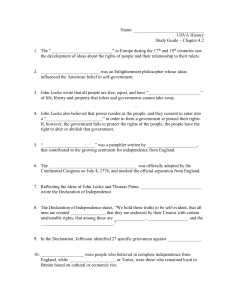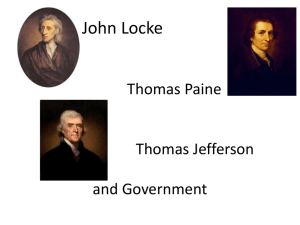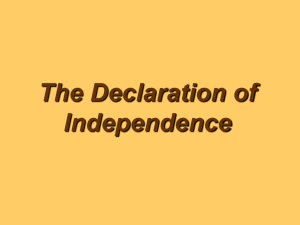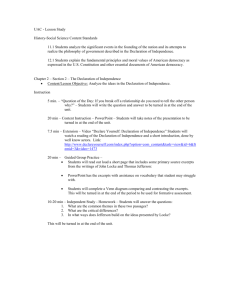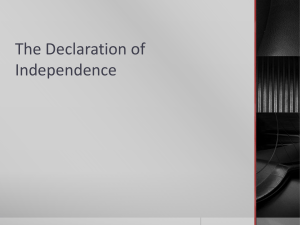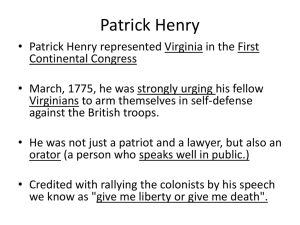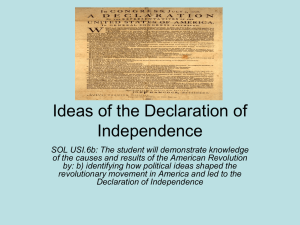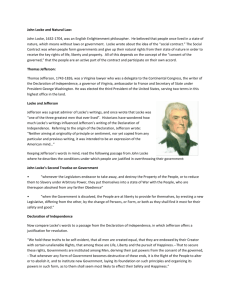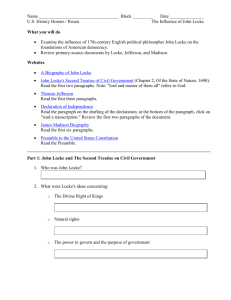Unit 2 powerpoint1
advertisement
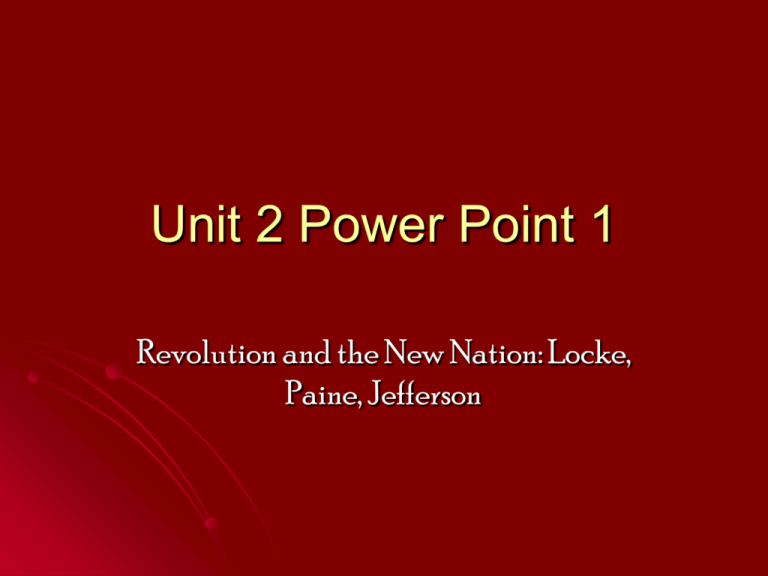
Unit 2 Power Point 1 Revolution and the New Nation: Locke, Paine, Jefferson New political ideas about the relationship between people and their government helped to justify the Declaration of Independence. The revolutionary generation formulated the political philosophy and laid the institutional foundations for the system of government under which American’s live. The American Revolution was inspired by ideas concerning natural rights and political authority, and its successful completion affected people and governments throughout the world for many generations. The ideas of John Locke The period known as the “Enlightenment” in Europe during the seventeenth and eighteenth centuries saw the development of new ideas about the rights of people and their relationship to their rulers. John Locke was an Enlightenment philosopher whose ideas, more than any other’s, influenced the American belief in selfgovernment. Locke wrote that: All people are free, equal, and have “natural rights” of life, liberty, and property that rulers cannot take away. All original power resides in the people, and they consent to enter into a “social contract” among themselves to form a government to protect their rights. In return, the people promise to obey the laws and rules established by their government, establishing a system of “ordered liberty.” Government’s powers are limited to those the people have consented to give to it. Whenever government becomes a threat to the people’s natural rights, it breaks the social contract, and the people have the right to alter or overthrow it. Locke’s ideas about the sovereignty and rights of the people were radical and challenged the centuries-old practice throughout the world of dictatorial rule by kings, emperors, and tribal chieftains. Many Enlightenment thinkers were Deists, who believed that God had established natural laws in creating the universe, but the role of divine intervention in human affairs was minimal. They believed in rationalism and trusted human reason to solve the many problems of life and society. Thomas Paine and Common Sense Thomas Paine was an English immigrant to America who produced a pamphlet known as Common Sense that challenged the rule of the American colonies by the King of England. Common Sense was read and acclaimed by many American colonists during the mid-1700s and contributed to a growing sentiment for independence from Great Britain. The Declaration of Independence The eventual draft of the Declaration of Independence, authored by Thomas Jefferson of Virginia, reflected the ideas of Locke and Paine. Jefferson wrote: “We hold these truths to be self-evident, that all men are created equal, that they are endowed by their Creator with certain unalienable Rights, that among these are Life, Liberty, and the pursuit of Happiness. “That to secure these rights, Governments are instituted among Men, deriving their just powers from the consent of the governed, “That whenever any Form of Government becomes destructive of these ends, it is the Right of the People to alter or abolish it, and to institute new Government….” Jefferson then went on to detail many of the grievances against the King of England that Paine had earlier described in Common Sense. The ideals expressed in the Declaration of Independence contradicted the realities of slavery and the undemocratic nature of political participation in the early decades of the new republic. The key principles of the Declaration of Independence increased political, social, and economic participation in the American experience over a period of time. Political participation (equality) Extending the franchise Upholding due process of law Providing free public education Social participation (liberty) Abolishing slavery Extending civil rights to women and other groups Economic participation (pursuit of happiness) Regulating the free enterprise system Promoting economic opportunity Protecting property rights Can we answer these questions? How did the ideas of John Locke and Thomas Paine influence Jefferson’s writings in the Declaration of Independence? How did the Declaration of Independence become a road map for the new republic as it extended the franchise, provided for equality of opportunity, and guaranteed “unalienable rights”?
